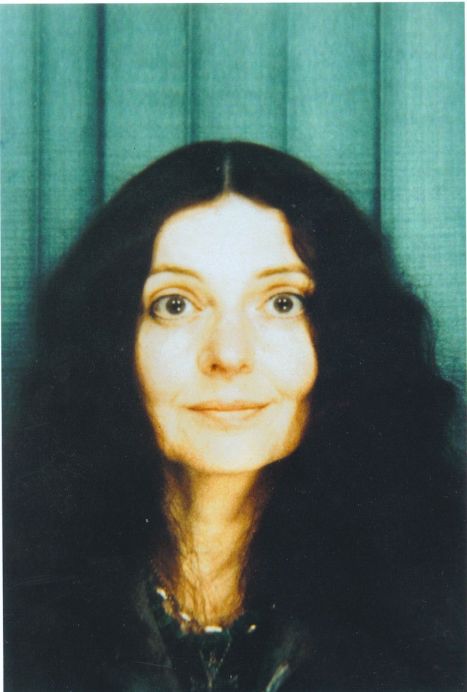
Margaret Ann Griffiths–scanned photo provided by David Adkins
Ruthless, witty, iconoclastic poetry–much of it formal, much of it free–by a lighthearted woman with much to be serious about. Just coming into international prominence as an internet-oriented poet as she turned 60, Margaret Ann Griffiths was dying of an incurable stomach ailment. She posted poems online under her own name and as “Maz” and “Grasshopper” from 2001 until her death in 2009. Her only book, Grasshopper, was assembled posthumously from her writings in print and on line around the globe; it has 352 pages of poems, plus an extensive preface by Alan Wickes.
Probably her best-known poem is the Eratosphere prize-winning Opening a Jar of Dead Sea Mud:
The smell of mud and brine. I’m six, awash
with grey and beached by winter scenery,
pinched by the Peckham girl who calls me posh,
and boys who pull live crabs apart to see
me cry. And I am lost in that grim place
again, coat buttoned up as tight as grief.
Sea scours my nostrils, strict winds sand my face,
the clouds pile steel on steel with no relief.
Sent there to convalesce – my turnkeys, Sisters
of Rome, stone-faced as Colosseum arches –
I served a month in Stalag Kent, nursed blisters
in beetle shoes on two-by-two mute marches.
I close the jar, but nose and throat retain
an after-tang, the salt of swallowed pain.
She was a brilliant sonneteer (which seems to be a less exalted compliment in the US than in the UK), but also irreverent in light verse as in Clogs which begins:
The Queen Mum’s gorn and popped her clogs;
the telly’s stuffed with Royal progs.
I’ve heard a thousand epilogues
now the old Queen Mum has popped her clogs…
skillful with dialect verse, as in Fer Blossom:
Tha’s not allowed ta bury pigs, tha knows.
I blinks et Blossom’s bulk stratched awt on
a bad of bettercups end pink-tinged deisies,
aye closed es ef ha nipped off en a nep…
skillful with unstructured verse, as in Falling:
In the library,
you fell over me.
You said, So sorry.
I said, Ouch.
Later you fell over me
on the couch…
parody, as in Cutlet, Mince of Denmark, whose Act 1 is:
What fowl noisette’s abroad this night? I walk
the battlements. Porked lightning! Next appears
my father’s goose. O Veni, son, he says. We talk
of offal oxtails – poussin in his ears!
And the rolling, sonorous Sholey, beginning
Sholey brings the summer in a shiny old tin bucket
every year. He walks head high across the mountains
carrying the flowers. In the brim of his wide hat
nestle songbird eggs in pastel clutches…
I find it impossible to quote a full range of her poetry, there is too much, too diverse. But my favourites are her sonnets, circling around her themes of pets and poets, nature and history, war, women and sex… and illness and death.
Born and raised in London, an archaeology student at Cardiff, she lived in Poole on England’s south coast for the last decades of her life. Online she worked with poets around the world; offline she lived alone and unknown, her death not discovered for a month.
Google her, read whatever shows up, and then buy Grasshopper. I would recommend it to anyone who reads or writes poetry, anyone. I dip into it periodically, and read it right through every two or three years.
M.A. Griffiths–Maz–with her technical skill, insight, imagery, empathy and vast range… might just be the early 21st century’s greatest poet.
You’ve certainly whetted my appetite. How have I managed to let her slip under my radar?
LikeLiked by 1 person
Classic example of obscurity through not being interested in fame. Dedicated to writing good poetry, helping others improve their work, publishing online. She didn’t start publishing until she was mid-50s, died eight years later, just as she was becoming known. Hopefully her work will become a classic case of being rescued from obscurity post mortem.
LikeLike
Hopefully we can join forces to publish a page of Maz’s poetry!
Mike
LikeLiked by 1 person